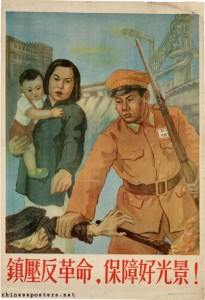Peformances and Realities in Regime Consolidation: The Campaign to Suppress Counterrevolutionaries and the White Terror in Su’nan and Taiwan, 1950-1954

6 pm, KWZ, Room 0.606
Julia C. Strauss
SOAS, University of London
Lecture Abstract:
Much of the state building literature that comes from a Weberian perspective focusses on the creation and solidification of state institutions, particularly those bureaucratic institutions concerned with external defense, internal order, the extraction of sufficient resources to fund the state apparatus, and the recruitment and socialization for the state bureaucracy itself. Other literatures in a more rational choice vein, particularly associated with Robert Bates’ work on Africa, focus on how incentives for individuals within state bureaucracies often lead to rent seeking behaviour that undercuts the wider state building project.
My work attempts to fill in the large grey areas and gaps between these two literatures on state building by focussing on an aspects of state building that is often simply assumed: how the higher reaches of the state mobilize the lower reaches of the bureaucracy and focus its attentions and commitments. I suggest that this process of state mobilization occurs through a complex of actions that can be loosely called the bureaucratic “campaign” that operates in tension with the more procedurally and precedent bound tendencies of government bureaucracies, and further draw on the related notions of repertoire and performance as critical elements to processes of both campaign mobilization and workaday bureaucratization. In so doing, I expand on Charles Tilly’s notions of “repertoire” (which he applied almost exclusively to social movements and protest from “below” as part of claim making) to consider two crucial factors in the consolidation of otherwise unrproven and/or outright illegitimate new regimes of the People’s Republic of China and the Republic of China (Taiwan) in the early 1950s. At this time, the young PRC and the recently relocated ROC (Taiwan) were deeply concerned about questions of internal (and external) security, and launched massive campaigns against real and imagined subversion through the Campaign to Suppress Counterrevolutionaries (PRC) and the “White Terror”. 1) how leaders themselves drew on particular repertoires as the “frames” that established the boundaries of the desirable and achievable in terms of preference formation and 2) how leaders utilized particular kinds of performances to communicate new norms, vocabularies, and practices to the population at large.
